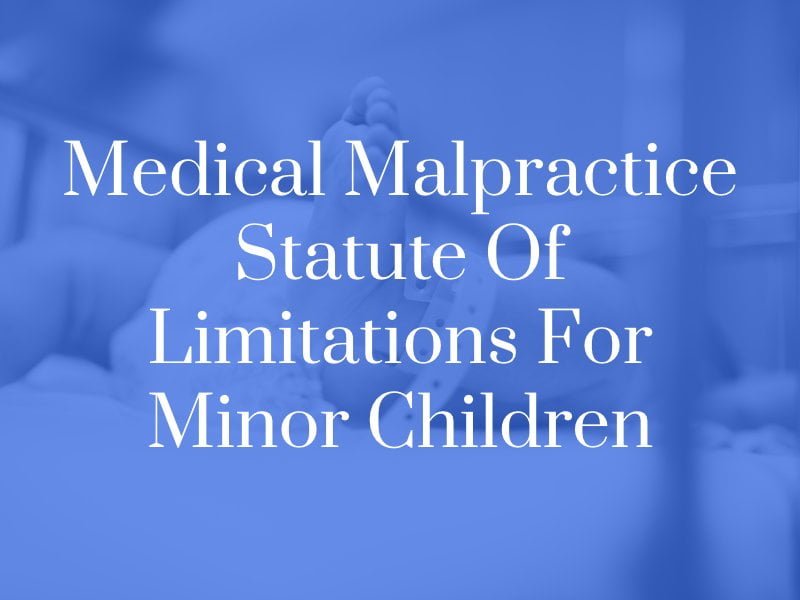What is the Medical Malpractice Statute Of Limitations for Minor Children?
January 30, 2020 in Medical Malpractice
New York state law specifically extends the time to bring a medical malpractice lawsuit for a minor child. Medical malpractice claims in New York must typically be filed within two and a half years of the day the injury occurred. However, there is an exception to that general rule, allowing the statute of limitations for a minor to start once they reach the age of 18. Meaning, a minor generally has until age 20 years and six months to bring a lawsuit for medical malpractice. However, as explained below, the maximum extension allowed for children under New York law in medical malpractice cases is 10 years from the time of the malpractice, meaning that, in some circumstances, the statute of limitations for a child may run BEFORE the age of 18.

The Importance of the Statute of Limitations
The statute of limitations is vital to medical malpractice cases, as once the time has run, victims are legally barred from recovering compensation. There are two main reasons why states have this type of law. First, it prohibits a plaintiff’s ability to threaten a lawsuit for an indefinite amount of time. Second, it helps to protect evidence. As time passes, evidence can disappear, become corrupted, or become less reliable.
Exceptions to the Statute of Limitations for Minor Children
There are a few exceptions to the statute of limitations for minor children, including:
10 Year Rule
The law in New York does not allow the statute of limitations be tolled (delayed) for longer than ten years. This, for example, means the parents of a seven-year-old must sue on behalf of their child, as the statute of limitations will have run out when the child turns 17. This rule can be very important, as a parent may not be aware of the time limit and can lose the right to recover compensation for their child.
The Limited Discovery Rule
Another exception is New York’s “limited discovery” rule. This applies to two situations, in which the victim could not have learned there had been medical malpractice:
- A foreign object found in the body. (Within 10 years of the incident)
- Delayed cancer diagnosis. (Within 7 years of the date of missed diagnosis)
Claims Against the Government
Additionally, the time limitations are generally shorter in cases against a federal, state, city, town or other public hospital/health care facility. Patients are also typically required to give a notice of claim prior to filing suit, and it must be sent within a specific amount of time from the date of injury.
Common Types of Medical Malpractice Involving Minors
Minor children are often injured by the following negligent actions committed by medical professionals:
Medication Errors
A child’s weight and metabolism can be far different from that of an adult, and incorrect dosages of medications can have catastrophic consequences.
Surgical Errors: Botched or unnecessary surgeries, overlooked allergies or even catastrophic errors such as operating on the wrong body part may occur.
Birth Injuries
Childbirth carries with it a certain level of danger. However, there are instances of negligent care, improper use of instruments, or failures to identify and diagnose the health of the baby during the birthing process that can cause an infant to suffer life-altering injuries at birth.
Wrongful Death
Certain errors such as misdiagnosis, hospital-acquired infections, procedural errors, and others can sometimes result in the wrongful death of a child.
Speak to an Experienced NYC Medical Malpractice Lawyer
If your child has been harmed by a doctor, pharmacist, surgeon, nurse, or hospital, don’t delay in contacting the New York City medical malpractice attorneys at Sullivan Papain Block McManus Coffinas & Cannavo, P.C. We will evaluate your claim for free. Call us at (212) 732-9000 or reach us through our contact form online.